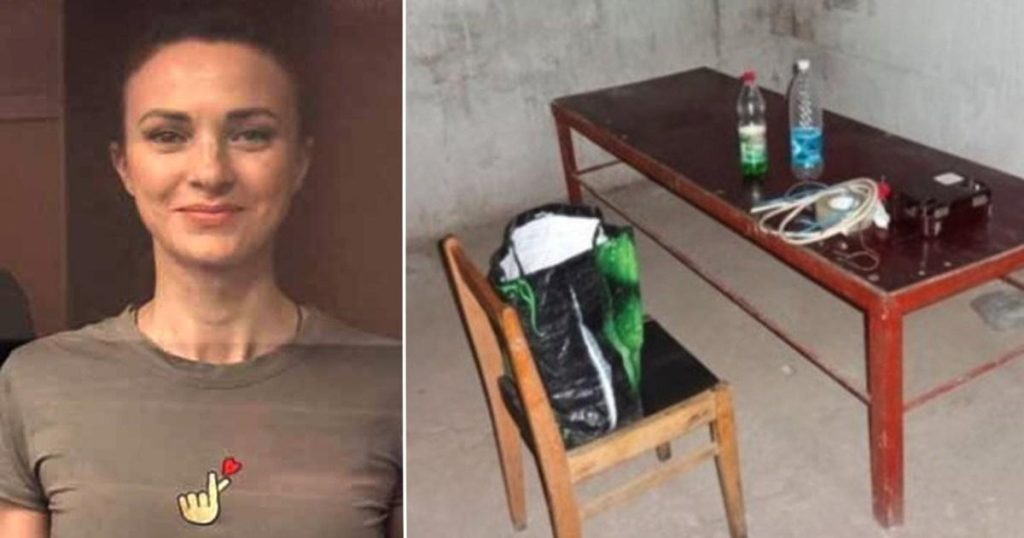Paragraph 1: The Ordeal of Natalia Vlasova
Natalia Vlasova, a Ukrainian mother, endured a horrific ordeal of torture and sexual violence at the hands of Russian militants in the Donbas region. Captured in 2018, four years before Russia’s full-scale invasion of Ukraine, Vlasova was subjected to unspeakable atrocities while held captive. She was later put on trial by a Russian court for terrorism, a charge based on a coerced confession. During the trial, she bravely recounted the torture she endured, including being electrocuted, having her teeth filed down, and being systematically raped by fifteen men. She also revealed chilling threats made against her young daughter’s life. Despite her testimony and claims of forced confession, the Russian court sentenced Vlasova to 18 years in prison.
Paragraph 2: The Horrors of Izolyatsia Prison
Vlasova’s testimony shone a light on the brutal conditions within Izolyatsia, a notorious Russian torture prison located in occupied Donetsk. She identified one of the key perpetrators of her abuse as Vasyl Yevdokimov, known as "Lenin," a prominent figure at the prison. Yevdokimov allegedly filed down Vlasova’s teeth, sexually assaulted her with a bottle, and orchestrated other horrific acts of violence against her. Vlasova’s account details the systematic dehumanization and brutality that Ukrainian prisoners endure within the walls of Izolyatsia, a facility that has become a symbol of Russian oppression in the occupied territories.
Paragraph 3: A Mock Trial and Disregard for Justice
The trial of Natalia Vlasova, along with two other Ukrainian men, Serhiy Hruzynov and Victor Shydlovsky, has been widely condemned as a travesty of justice. The charges of terrorism leveled against them appear to be based solely on coerced confessions, with no corroborating evidence presented. The judge, Oleg Aleksandrovich Cherepov, completely disregarded Vlasova’s harrowing testimony of torture and sexual violence, accepting the forced confession as the sole basis for conviction. This disregard for due process and the blatant disregard for evidence of torture underscores the lack of judicial integrity within the Russian-controlled legal system in occupied Ukrainian territories.
Paragraph 4: Sexual Violence as a Weapon of War
Vlasova’s case is not an isolated incident. Numerous reports have emerged documenting the widespread use of sexual violence by Russian forces against Ukrainian civilians, including women, men, children, and the elderly. This systematic use of rape and sexual assault is not random but appears to be a deliberate strategy of terror employed by Russian troops to intimidate and subjugate Ukrainian communities. Experts in sexual violence have characterized these acts as part of a broader pattern of war crimes aimed at breaking the spirit of the Ukrainian population.
Paragraph 5: Sentences and International Condemnation
The sentences handed down to Vlasova, Hruzynov, and Shydlovsky – 18, 22, and 20 years respectively – have been met with international condemnation. Human rights organizations have denounced the trial as a "legal absurdity," highlighting the lack of due process and the reliance on coerced confessions. The case has drawn further attention to the ongoing human rights abuses occurring within Russian-occupied territories and the urgent need for accountability for these crimes.
Paragraph 6: The Larger Context of Russian Atrocities
The case of Natalia Vlasova provides a chilling glimpse into the brutality and inhumanity of the Russian occupation in Ukraine. Her ordeal, along with the countless other documented cases of torture, murder, and sexual violence, paints a grim picture of the widespread human rights violations being perpetrated. As the conflict continues, it is crucial that these atrocities are documented and that those responsible are held accountable. The international community must continue to pressure Russia to end these abuses and to ensure that justice is served for the victims of this ongoing conflict.











